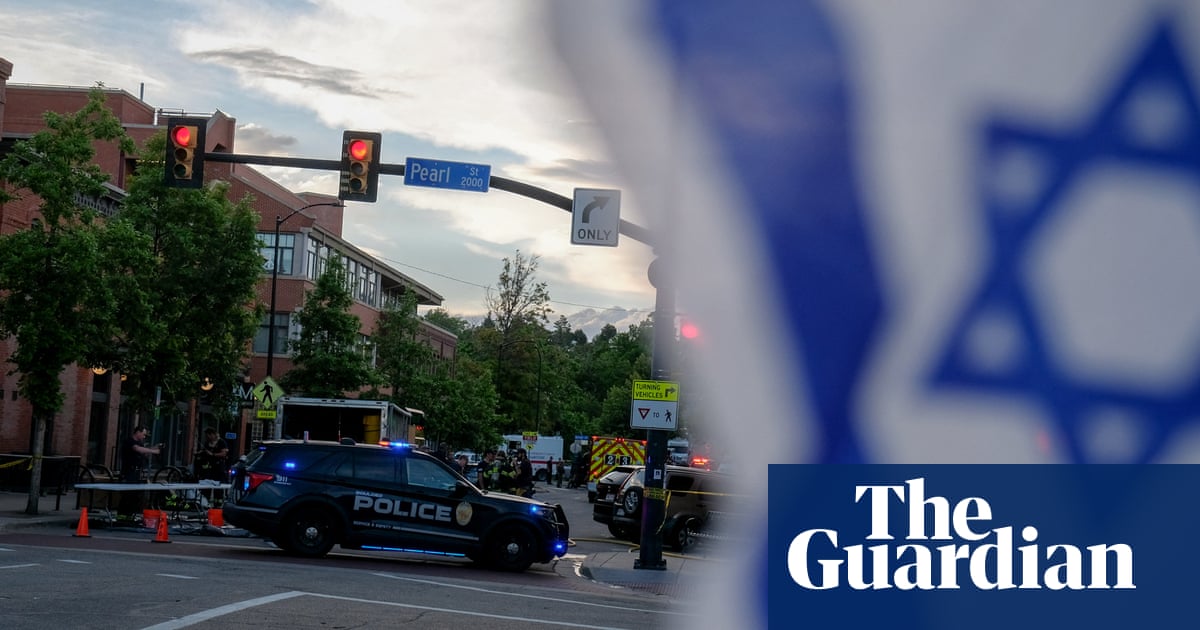The first 911 calls reporting the Coloradoflamethrower attackwere as horrific as they were unbelievable.
“There is a male with a blow torch setting people on fire,” a dispatcher advised the city’s police department, passing on the account of an eyewitness. Another official reported: “Multiple burns, potential terror attack.”
What had been a peaceful rally at the Boulder’s Pearl Street Mall on Sunday in solidarity with hostages still held by Hamas in Gaza quickly turned into a scene of horror, with medical crews arriving to find victims lying or sitting on the ground with their legs and bodies burned – and police holding a suspect face down with a gun at his back.
Members of the public raced from local restaurants with buckets and jugs of water to pour over those who were injured.
The attack by a man hurling molotov cocktails and shouting “Free Palestine” struck at the heart of one of Colorado’s largest Jewish communities, just 10 days after two Israeli embassy staffers wereshot dead in Washington DCby a man yelling the same statement. It also came weeks after anarson attackon the home of Josh Shapiro, the Jewish governor of Pennsylvania, by a pro-Palestinian activist.
“Make no mistake: if and when Jews are targeted to protest Israel’s actions, it should clearly and unequivocally be understood and condemned as antisemitism,” Amy Spitalnick, chief executive of the Jewish Council for Public Affairs, saidin a statement.
“These attacks come alongside a broader rise in antisemitism, from hate crimes targeting Jews walking down the street, to efforts to marginalize, isolate, and discriminate against Jews, to antisemitic and white supremacist mass violence targeting synagogues and other spaces.”
Boulder county, where Sunday’s attack took place, had long been considered a safe, “dream community” for Jewish families drawn there over the last decade. Numbers have doubled to represent more than 10% of the county’s 330,000 population.
The eight victims – four men and four women, including an 88-year-old Holocaust survivor, and a mother and daughter – represented a cross-section of a vibrant diaspora in a city with numerous Jewish community centers, schools and businesses.
“What happened here in our local community in Boulder is shameful, and I think people really need to have a sense of accountability,” Fred Greene, rabbi of Boulder’s Har HaShem congregation, told CNN on Monday.
“If we want peace, if we want dignity for people, there have to be other ways than this kind of violence.”
Another expert, University of Boulder Hillel executive director Elyana Funk, told the network that the assault was especially shocking because it targeted a “quiet and respectful” assembly of residents who were taking part in a solidarity walk, which has become popular in numerous Jewish communities around the world since the Hamas terror attack on Israel and taking of hostages on 7 October 2023.
“This wasn’t a pro-Israel rally or some sort of political statement on the war,” she said. “These are peaceful people who’ve been walking for nearly 20 months weekly to bring awareness for the hostages.”
The attack came on the same day as the start of Shavuot, a two-day Jewish festival to celebrate the 50th day after the Passover holiday. Several events were postponed or canceled after the attack, but Funk said resilience would shine through.
“The antidote for antisemitism can be Jewish joy, and Jewish community and Jewish connection,” she said.
Meanwhile, the Boulder police chief, Stephen Redfearn, recalled the community reaction to the2021 mass shootingat a supermarket in the city that left 10 people dead.
“Boulder is not immune to tragedy sadly and I know a lot of people are scared right now and questioning how this happened and why,” he said at a press conference on Sunday night.
“Boulder has recovered from acts of violence before and we will again recover. I urge this community to come together. Now is not the time to be divisive.”
The attack took place on Pearl Street Mall, a popular pedestrian area of downtown Boulder laced with stores and restaurants, overlooked by the University of Colorado, and a regular venue for the event supportingRun for Their Lives, an organization calling for the immediate release of the Gaza hostages.
Eyewitnesses said the suspect, 45-year-old Mohamed Sabry Soliman, appeared out of nowhere and seemingly singled out individuals taking part in the rally.
“It was easily the most horrific thing I’ve ever seen in my life,” Brian Horowitz, 37, told CNN.
The Denver resident said he was in a cafe with his family when he heard screams and raced to confront the suspect, who was shouting profanities at his victims.
“‘Fuck you Zionists,” Horowitz said the man yelled. “‘You’re killing my people so I kill you.’”
Horowitz added: “There’s someone who is outraged enough to go and attack these elderly people who are doing absolutely nothing to provoke it other than walk in silence and meet in a courtyard peacefully. It’s unbelievable.”
